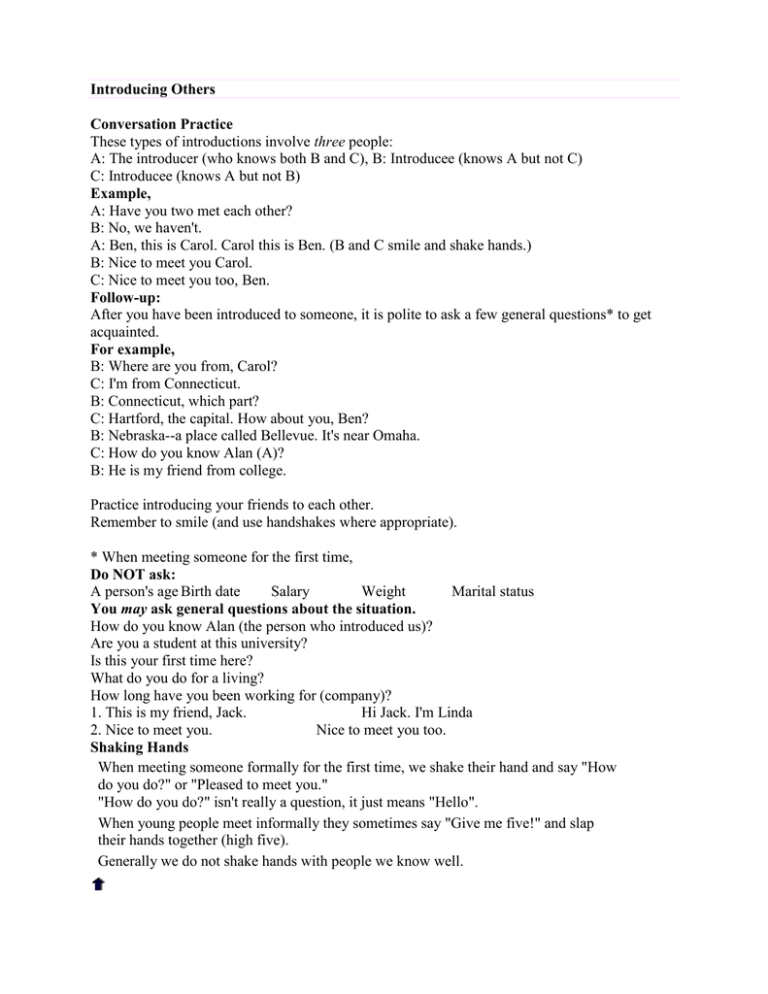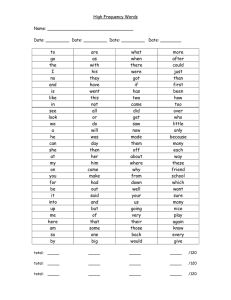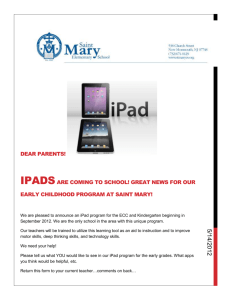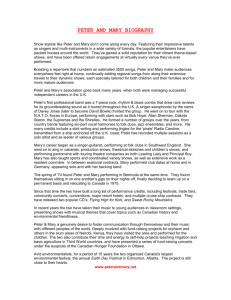Introducing Others: Conversation Practice
advertisement

Introducing Others Conversation Practice These types of introductions involve three people: A: The introducer (who knows both B and C), B: Introducee (knows A but not C) C: Introducee (knows A but not B) Example, A: Have you two met each other? B: No, we haven't. A: Ben, this is Carol. Carol this is Ben. (B and C smile and shake hands.) B: Nice to meet you Carol. C: Nice to meet you too, Ben. Follow-up: After you have been introduced to someone, it is polite to ask a few general questions* to get acquainted. For example, B: Where are you from, Carol? C: I'm from Connecticut. B: Connecticut, which part? C: Hartford, the capital. How about you, Ben? B: Nebraska--a place called Bellevue. It's near Omaha. C: How do you know Alan (A)? B: He is my friend from college. Practice introducing your friends to each other. Remember to smile (and use handshakes where appropriate). * When meeting someone for the first time, Do NOT ask: A person's age Birth date Salary Weight Marital status You may ask general questions about the situation. How do you know Alan (the person who introduced us)? Are you a student at this university? Is this your first time here? What do you do for a living? How long have you been working for (company)? 1. This is my friend, Jack. Hi Jack. I'm Linda 2. Nice to meet you. Nice to meet you too. Shaking Hands When meeting someone formally for the first time, we shake their hand and say "How do you do?" or "Pleased to meet you." "How do you do?" isn't really a question, it just means "Hello". When young people meet informally they sometimes say "Give me five!" and slap their hands together (high five). Generally we do not shake hands with people we know well. Naturally speaking Mr Bean meets Mrs Breuer, one of his students, and her husband in the street. Good morning, Mrs Breuer. Mr Bean: Good morning, Mr Bean. How are you? Mrs Breuer: I'm fine thanks, and you? Mr Bean: Not too bad. Mr Bean, this is my husband Michael, Michael this is Mr Mrs Breuer: Bean my English teacher. Pleased to meet you. Mr Breuer: Pleased to meet you too. Are you from Germany, Mr Breuer? Mr Bean: Yes, East Germany, from Dresden. And you, are you from London? Mr Breuer: No, I'm from Derby, but I live in London now. Mr Bean: Well, goodbye Mr Bean, it was nice to see you. Mrs Breuer: Yes, goodbye. Mr Bean: Formal to Informal Greetings and Introductions First meetings Formal Introducing yourself Introducing others How do you Mrs Hand, do? My name may I is Mrs Hand. introduce my boss, Mr Smith. Responding to an introduction Pleased to meet you Mrs Hand. Hello, Lynne Lynne, I'd Hand. I'm the like you to owner of this meet John web site. Smith, our salesman. John, this is Lynne Hand. Lynne Hand. Lynne, meet John, my husband. John, this is my teacher Lynne. Informal Subsequent Formal meetings Pleased to meet you Lynne. Possible Greetings On Leaving Goodbye. It's a pleasure to have met you. Goodbye. Nice to have met you. Hi, Lynne. How are you? Bye. It was nice to meet you. Possible responses Hello, Mrs Hand. It's nice to see you again. What a pleasant surprise! How are you? It's been a while. Good morning Mrs Hand. How are you today? I'm very well thank you. And you? Good afternoon, Mrs Hand. It's good to see you. Thank you. It's nice to see you too. How are you? Hello Lynne. How are you doing? Fine thanks. What's new with you? Hi, Lynne! How's it going? Hi, Lynne. How are things? Not too bad, busy as ever. Oh fine. You know how it is. Informal !Note - on first meeting say, "It's nice to meet you", and when departing "It was nice to meet you". For future meetings say, "It's nice to see you again", and when departing, "It was nice to see you again." There are a number of phrases that are commonly used to introduce strangers. Anne, do you know Mary? (introducing Mary to Anne.) Mary, this is my friend Anne. (introducing Anne to Mary.) John, I don't think you have met Sally. (introducing Sally to John.) I don't think you two know each other, do you? (introducing two strangers to each other.) Gautam, meet my friend Arjun. (introducing Arjun to Gautam.) John, I don't think you've met Peter. I don't think you know Alice May I introduce you to Mary? Mary, do you know Jane? Peter, I'd like you to meet John. Friends, can I introduce Mr John? (formal) When you are introduced to somebody, you usually say How do you do? Americans often say How are you? This is formal. In an informal style you can say Hello or Hi. Note that How do you do? is not a question, and the normal reply is How do you do? People who are introduced often shake hands. You may introduce yourself saying My name is … or I am … My name is Manju. OR I am Manju. Example conversation Here is a short introductory conversation: John (to Peter): Peter, I'd like you to meet Mary. Peter (to Mary): How do you do? Mary (to Peter): How do you do. John (to Peter): Mary is my cousin. When somebody is introduced to you, it is also common to greet that person with It's a pleasure to meet you orPleased to meet you. John: Peter, I'd like you to meet Mary. Peter (to Mary): It's a pleasure to meet you. Mary (to Peter): How do you do. John: Mary is my cousin. John: Peter, I'd like you to meet Mary. Peter (to Mary): How do you do? Mary (to Peter): Pleased to meet you. John: Mary is my cousin. In informal situations, introductions are often made simply saying: This is (name). It is also common to just say Hi orHello as a response in this informal setting. John: Peter, this is Mary. Peter: How do you do? Mary: Pleased to meet you. John: Mary is my cousin. Source: http://www.perfectyourenglish.com/speaking/introducing-people.htm





